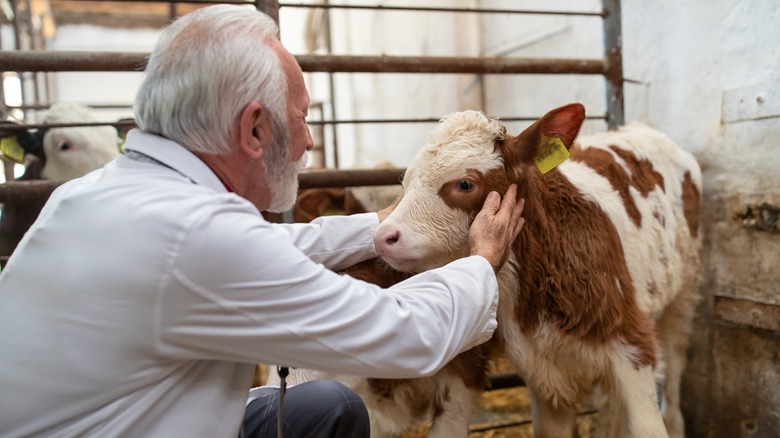New Study Examines The Major Economic Downside Of Plant-Based Beef
Benefits of eating plant-based foods abound, evidenced by the quickly growing number of people incorporating them into dietary lifestyles. U.S. retail sales of plant-based food products that replace animal-based ones have increased 43% over two years, per the Good Food Institute — and that's only the beginning.
Bloomberg Intelligence predicts a huge increase by 2030, with global market value reaching more than $162 billion, based on the "Plant-Based Foods Poised for Explosive Growth" report. That compares to just $29.4 billion in 2020. Reasons for the change range from personal health choices to environmental concerns, population growth, and changing production methods.
With consumers embracing the concept and reality of this continuing culinary shift, all is rosy in the world of plant-based dining, right? Maybe. But, a recent research study by leading U.S. universities and international partners reveals a few caveats — and at least one significant concern. It's mostly about the economics, but not the ones you might imagine.
It's all about the jobs
Corporate profits and losses dominate the news every day, and rightfully so. They impact product availability and overall economic growth while providing countless jobs. And, it's precisely those jobs, rather than corporate profit margins, receiving a fresh look as the world veers sharply toward plant-based beef.
Replacing animal-based food products comes with positive global impacts, including the potential carbon footprint reduction of 2.5 to 13.5%, according to Science Daily. Based on studies by Cornell and Johns Hopkins Universities and associates, the environmental impact would assume a decrease of two to 12 million cows used for beef products — and that affects jobs.
The Lancet notes that beef production and supporting entities contribute jobs and income to millions of people. From laborers to ranchers, farmers, butchers, veterinarians, and feed and equipment suppliers, the related jobs are extensive, per the Houston Chronicle. The shift away from beef also impacts agricultural communities by upheaval to lifestyles, identities, and food cultures, explains The Lancet.
Questions arise over benefits versus sacrifices for societies transitioning to healthier plant-based eating. Health concerns give credence to the shift, with WebMD noting excessive beef consumption carries increased risks for heart disease, cancer, and diabetes. But, authors of the study cited by Science Daily stress that plant-based alternatives are not a silver bullet and even have their own environmental impacts, such as increased water required for growing. Proposed solutions must address the needs of small producers, displaced workers, and communities that depend on cattle farming.

